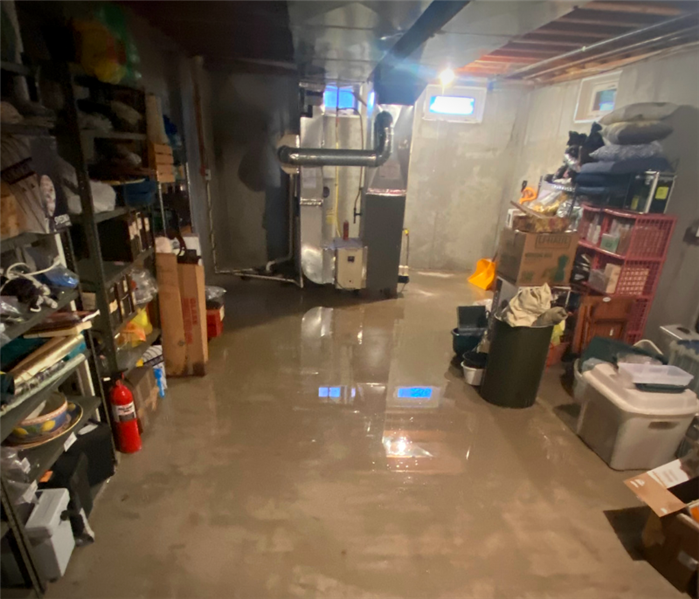Water Heater Flooded Basement - What To Do
12/16/2020 (Permalink)
Did you know that 75% of hot water heaters fail before they're even 12 years old? This means that gallons of water are likely to leak or burst from the water heater and cause flooding in your home.
So what do you do when your water heater causes basement flooding? Here we will review everything you need to know about water heaters and flooded basements, including why it happens and how to prevent it.
What To Do When Your Water Heater Floods Your Basement
1. Be mindful of any safety hazards.
If the water heater caused major flooding in your basement to the extent that is is submerged in water, move forward with caution. There is always the hazard of electrocution in flood water that has appliances submerged in it. Flooding can also cause gas leaks, which is applicable when you have a gas water heater or heating system. For extra precautions, turn off the electricity and gas to the home.
2. Turn off the water.
This will prevent further flooding depending on where the water is coming out of the water heater.
- If the water heater is leaking from the pressure relief valve, or the heater tank has burst, turning off the water will be the only way to stop the flow of water. Even after a water heater bursts, the cold water pipe will continue to deliver 5 to 15 gallons of water to the heater every minute.
- If the water heater has a leak from the tank itself but hasn't burst, turning off the water will not completely stop the leak as it is full of 40 gallons or more of water. In these cases, you must connect the hose to the drain valve and drain the tank.
3. Remove standing water from the basement.
For a small amount of water from a small water heater leak, you can use a wet dry vacuum, a mop, bucket, and towels. For larger amounts of water (2+ inches across the entire basement), you can try to use a submersible portable sump pump to pump water out of the basement. Open a window for the runoff water and be sure it is flowing away from the home.
- If your basement sustains major flooding and this step cannot be done yourself, call a water damage restoration company. They use commercial grade equipment that will quickly remove all water from your basement. These companies are also approved by your homeowners insurance, allowing the complete clean up of water without any money coming out of your pocket.
4. Call your insurance company and file a claim.
The one good thing about water heaters flooding a basement is that the damages are covered by your homeowners insurance. Your insurance company will inform you of next steps to take, such as calling a flood damage restoration company to ensure the flood is properly and completely cleaned up. These companies take steps to ensure your basement and any affected materials are completely dried after water damage to prevent the growth of mold or create structural issues.
5. Call your plumber.
Sometimes this will be the first step you take, while other times this will be the last. This step depends on the extent of flooding from your hot water heater. If there is a small flood that you're cleaning up yourself, you'll want to call the plumber right away to fix the issue and return hot water to your home.
In the case where a water heater causes a flooded basement, you'll have to wait to call your plumber until the flood water has been cleaned up by the water damage restoration company. The plumber will not want to repair your water heater in a foot of water, and it is not safe for them to do so either.
Depending on the cause of your water heater leak, you may need to repair or replace your water heater.
How to Prevent Water Heater From Flooding Basement
Taking steps to prevent a leaking or burst water heater can end up saving you thousands out of pocket or in insurance claims. Take the following steps to help prevent and minimize damages from a leaking water heater:
- Install a drain pan that drains outside of your home
- Install a leak detector that will automatically turn off the water when a leak is detected
- Flush out the water heater regularly
- Immediately repair or replace any faulty or leaking components
- Have it inspected immediately after the warranty has expired and continue annually until a professional recommends it be replaced
- Keep an eye out for small leaks that can become catastrophic later
- Learn the signs that your water heater is failing:
- Abnormal noises, such as popping or rumbling
- Gas smell from a gas water heater, indicating some sort of gas line leak
- Leaks
- Hot water has flakes or rust or sediment in it
- Water heater is rusty





 24/7 Emergency Service
24/7 Emergency Service
